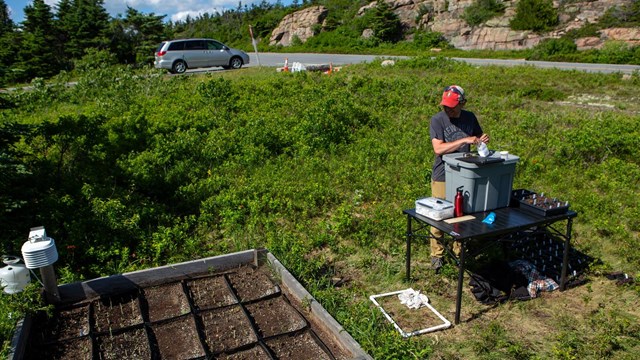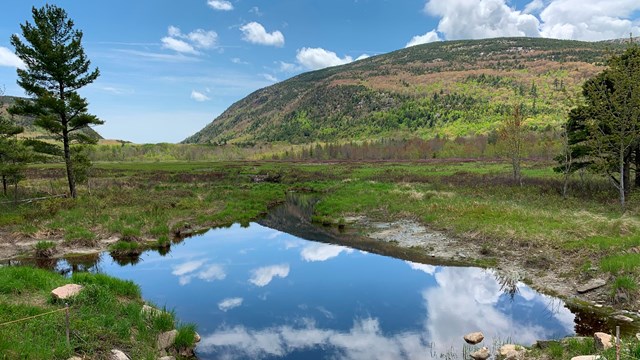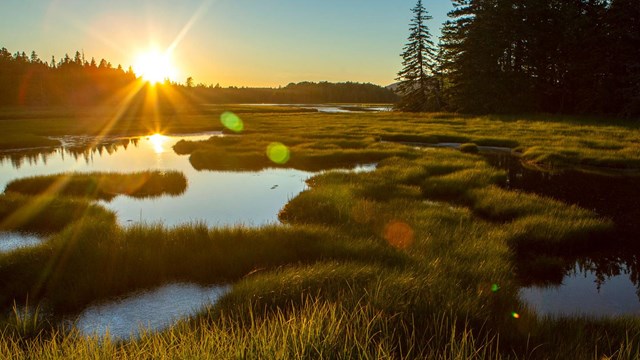|
While Acadia's beauty endures, its forests, lakes and coasts have been altered (over the past 100+ years) by human influence such as climate change, land use, pollution, increased visitation. As a result, Acadia faces many threats driven by climate change, ranging from invasive plants and insects to rising temperatures and significant storms. We use science to care for Acadia in the face of this rapid environmental change. But the science is changing and, as a result, so is how we’re managing the park. Schoodic Institute & Friends of AcadiaWorking together with Acadia's primary partners, Schoodic Institute and Friends of Acadia, Acadia National Park is currently leading the way in partnership-based, interdisciplinary, and updated approaches to keeping Acadia resilient and adaptive in the face of climate change. Current research projects at the summit of Cadillac Mountain, Great Meadow Wetland, and Bass Harbor Marsh are testing and evaluating new management approaches. This cutting edge research is already informing how other parks and protected areas around the world are managed in the face of environmental change. 
Science at the Summit
Learn about the ways climate change is challenging researchers to rethink how they manage Acadia's fragile mountain summits. 
Great Meadow Wetland
Learn about this expansive wetland ecosystem and the steps scientists are taking to restore its health in the face of change. 
Bass Harbor Marsh
Learn more about beautiful Bass Harbor Marsh and efforts by researchers and volunteers to stem the tide of invasive species. Schoodic InstituteThe Schoodic Institute supports scientific research of importantance to Acadia National Park. This reasearch is critical to assisting park leadership make management decisions for the present and future problems facing the park. Schoodic Institute also partners with the park in providing opportunites for teachers, students, and visitors to engage in science education and citizen science opportunities. The insitute also helps run the Acadia Science Symposium which is a series of events that provides a forum to learn about science taking place in the region and to interact and build collaborations with scientists, educators, students, park staff, and others working in a range of fields. Schoodic Institute is the largest of 18 National Park Service Research Learning Centers. In this position it also helps facilitate innovative partnerships such as Second Century Stewardship and the Citizen Science Association. Friends of AcadiaFriends of Acadia is the official friends partner for the park. They work together within their organization to help support the parks scientic goals. Fundraising, applying for grants, and even having staff members leading conservation projects within the park are just a few of the many ways that Friends of Acadia helps support scientific research, conservation, and management in Acadia. Colleges & UniversitiesAcadia National Park helps support research opportunities for a variety of researchers from universities and colleges all over the world. These research projects help support a better understanding of the natural world and conservation efforts in numerous places. The park also has long standing partnerships with universities to increase research and learning opportunities for students as well as assist the park in making management decisions. College of the AtlanticCollege of the Atlantic is located on Mount Desert Island where most of Acadia National Park. Due to its proximity to the park, students and professors from COA continue to conduct research within park boundaries. They assist park resource staff in inventorying, monitoring, and managing a variety of natural resources throughout the park. Often assisting in monitoing many of Acadia's smaller islands that surround Mount Desert Island. University of MaineAs the flagship unviersity in the state, Acadia has a very strong relationship with the University of Maine. Professors at the university take advantage of the scientifc laboratory that is Acadia National Park. A variety of their own research projects happen within park boundaries. There are also many professors that work with Acadia National Park staff to conduct critical research projects in the park. Many of these projects are helping Acadia make management decisions into the future in response to the affects of climate change. Worcester Polytechnic InstituteWorcester Polytechnic Institute has a long standing relationship with Acadia National Park. Every year, students of WPI work together with educators from the school to assist Acadia National Park with visitor use issues. Together with park officials, students from the school work on creative soultions to increasing accessibility thoughout the park for visitors to Acadia. Internal NPS PartnersNortheast Temperate NetworkThe NPS Northeast Temperate Network helps its member parks including Acadia better understand the parks ecosystems, waters, and other natural resources through long-term monitoring and periodic inventories. The Northeast Temperate Network collects, manages, and translates high quality information about the condition of natural resources so that Acadia National Park leadership can make better-informed management decisions. This information is also valuable for supporting research projects, providing educational opportunities, and promoting better public understanding of park natural resources.
|
Last updated: April 5, 2023
